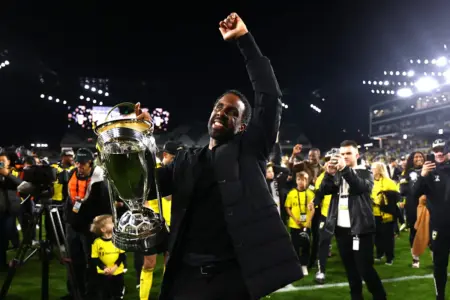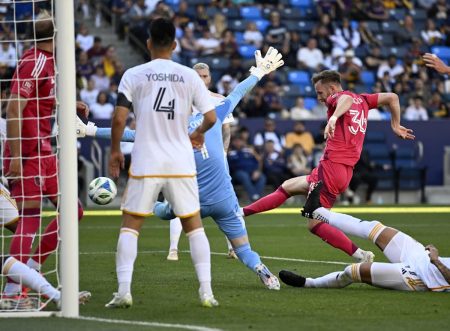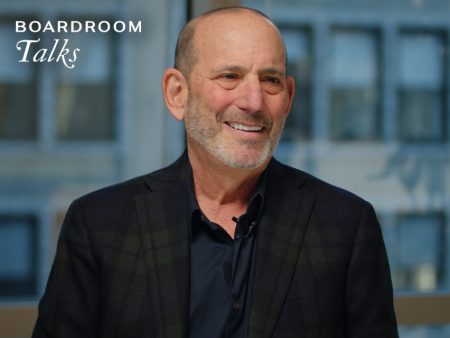MLS Valuations on the Rise: A Growing Divide
On the latest episode of Sporticast, hosts Scott Soshnick and Jacob Feldman are joined by Sportico’s Kurt Badenhausen to delve into the latest MLS valuations. The average MLS team is now worth $72 million, marking a 6% increase from 2024. However, this growth is not uniform across the league. A growing divide is becoming evident between the top franchises and the rest. Badenhausen provides insights into how the league’s big-market teams are leveraging their natural advantages to capitalize on this growth. These teams are not only benefiting from their larger markets but are also actively engaging in innovative strategies to attract more fans and revenue. This includes robust marketing campaigns, extensive community engagement, and strategic partnerships with local businesses. The success of these big-market teams is crucial for the league’s overall health and competitiveness, as it sets a benchmark for others to follow and drives the overall growth of the sport in the United States.
Small Market Success Stories and Expansion Franchises
Despite the prominence of big-market teams, MLS has also seen significant success in smaller markets. Cities like Columbus and Cincinnati have demonstrated that a passionate local fan base and effective management can lead to substantial business success. Columbus Crew, for instance, has built a strong community presence and a loyal fan base through consistent performance and community engagement. Similarly, FC Cincinnati has capitalized on its local enthusiasm and a well-executed expansion strategy to become a formidable force in the league. The league’s ability to nurture and support teams in these smaller markets is a testament to its strategic foresight and commitment to fostering a diverse and vibrant soccer landscape. Additionally, the development of expansion franchises in new markets, such as St. Louis City SC, has been a resounding success. These new teams have brought fresh energy and investment into the league, further expanding its reach and appeal.
The Messi Effect and the 2026 World Cup
One of the most significant developments in MLS is the arrival of Lionel Messi at Inter Miami. As Messi enters his second full season with the club, Soshnick, Feldman, and Badenhausen discuss the profound impact he has had on the league. Messi’s stellar performances and global star power have not only boosted Inter Miami’s popularity but have also elevated the profile of MLS on the international stage. The hosts also touch upon the ticking clock before the 2026 World Cup, which will be co-hosted by the United States, Canada, and Mexico. Preparations for this event are well underway, and the question of what MLS needs to do to continue building interest is a critical one. The league must focus on enhancing its domestic infrastructure, increasing its global visibility, and fostering a strong connection with the international soccer community. American success in the next World Cup tournament is seen as a key ingredient in this equation, as a strong performance can further cement the league’s reputation and attract more top-tier talent and investment.
Apple Partnership and Content Distribution
MLS is also entering its third year of a long-term partnership with Apple, and the league has announced several changes for the new season. The expansion of MLS Season Pass with new deals with Comcast, DirecTV, and T-Mobile is a significant step in broadening the reach of the league’s content. The introduction of primetime Sunday night games is another strategic move to attract more viewers and engage a broader audience. These changes underscore MLS’s commitment to leveraging technology and innovative distribution strategies to grow its fan base and revenue streams. However, questions remain about how well soccer can reach new fans when most of its games are behind a digital service paywall. The hosts and Badenhausen discuss the challenges and opportunities presented by this model, emphasizing the need for a balance between monetization and accessibility to ensure the long-term growth and sustainability of the league.
The Future of MLS: Strategic Challenges and Opportunities
As MLS continues to evolve, the hosts and Badenhausen highlight the strategic challenges and opportunities that lie ahead. The league must navigate the growing divide between big-market and small-market teams while supporting the development of expansion franchises. The impact of Lionel Messi and the 2026 World Cup are pivotal in shaping the league’s future, and the success of these initiatives will be crucial for its continued growth and international recognition. The Apple partnership and content distribution strategies are also key components of the league’s growth plan, but they must be managed carefully to ensure that they do not alienate potential new fans. As the league moves forward, a focus on community engagement, innovative marketing, and strategic partnerships will be essential in maintaining its momentum and building a sustainable and thriving soccer ecosystem in the United States.
Staying Informed and Engaged
For those interested in following the latest developments in MLS and the broader soccer landscape, Sportico’s newsletter and social media channels are excellent resources. You can subscribe to the Sporticast podcast through platforms like Apple, Google, Spotify, YouTube, or wherever you get your podcasts. By staying informed and engaged, fans and industry professionals can better understand the dynamic and exciting world of MLS and its potential for future growth.










